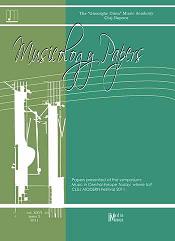THE ESCAPE - THOUGHTS ON HUNGARIAN AND CENTRAL-EUROPEAN RELIGIOUS MUSIC, ON STYLISTIC TRENDS AND ON SPIRITUAL ASPECTS OF CREATION
THE ESCAPE - THOUGHTS ON HUNGARIAN AND CENTRAL-EUROPEAN RELIGIOUS MUSIC, ON STYLISTIC TRENDS AND ON SPIRITUAL ASPECTS OF CREATION
Author(s): Selmeczi GyörgySubject(s): Music
Published by: MediaMusica
Keywords: creation; intonation; sacred genres; musical language
Summary/Abstract: The system of ideas pertaining to the Enlightenment and democracy began to adjust the standard of natural selection on an ever lower level, and this process has not yet ended. From the viewpoint of linguistics and the psychology of creation we can determine those somehow tectonic movements that have gradually distanced art music from the world of everyday thinking and tastes. For the composers at the end of the 20th century, it became increasingly obvious that music history and the heritage of musical language are not processes in linear development, but rather the history of a multitude of parallel metamorphoses, along which simpler or more complicated structures interchange periodically or rhapsodically. A particular importance belongs to how sacred genres can synthesize those intonations (and here I understand the term intonation in all its complexity, in order to stress the character and its various modalities) of very different origins, whose source is to be found in the medieval world of the tropes (Gregorian), in the layers of ancient folklore, in the coded forms of the Renaissance and early Baroque, but also in the tradition of the nineteenth century (Schumann, Berlioz, Verdi, Liszt). A new epoch of transformations has been taking shape for the past two decades. Starting from under the protecting umbrella of vocality, more and more composers dare claim the right to existence of the “organic” musical language in the instrumental world of chamber music as well.
Journal: Lucrări de Muzicologie
- Issue Year: 2011
- Issue No: 2
- Page Range: 14-22
- Page Count: 9
- Language: English
- Content File-PDF

